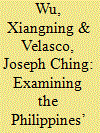| Srl | Item |
| 1 |
ID:
188430


|
|
|
|
|
| Summary/Abstract |
When great powers such as the United States and China grow especially hawkish with more uncertainties, how does a smaller state react to such a complex and dangerous territorial conflict? Given the competing frames of influence between China and the United States, what are the underlying reasons for the shift in the Philippines’ foreign policy? This paper focuses on the Philippines’ changing foreign policy on the South China Sea dispute and examines the main rationale for its shift in strategy towards China. We use the perspective of neoclassical realism to unpack the constraining factors that underlie the Philippines’ domestic politics and ongoing global exigencies. With changes in its domestic politics and the security challenges posed by the evolving geopolitics of the Indo-Pacific region, the Philippines is in a difficult situation, having to choose between a territorially hostile trading partner and its historical security guarantor.
|
|
|
|
|
|
|
|
|
|
|
|
|
|
|
|
| 2 |
ID:
177630


|
|
|
|
|
| Summary/Abstract |
Chinese scholars have cordially insisted on the tangible economic benefits of the Belt and Road Initiative (BRI). However, their counterparts outside China mostly focus on BRI's revisionist outcome. This dichotomy in the BRI study testifies to a security dilemma embedded in the geostrategic tug-of-war between China and the United States. The U.S. Indo-Pacific Strategy (IPS) openly postulates a "pushback" of the BRI, which further highlights China's potent vulnerability in BRI expansion along with the critical choke points in both global waterways and through continental masses. As the BRI's military geography overlaps its geostrategic reach, the military factor is relevant. This article holds that it is plausible to assess the likely BRI geostrategic effects with the instruments of international relations theories, such as geopolitics. This article evaluates the BRI's well-being from a military standpoint that reflects the great power rivalry. The BRI's inherent military-security ramifications contribute to the restructuring of the existing geopolitical order across the Eurasian continents. A major security challenge for the BRI is the IPS's security/defense connectivity that may point to a new pattern of coordinated military balancing against China in general and its BRI expansion in particular. The People's Liberation Army (PLA) will be logically tasked to protect the BRI through capability enhancement and overseas presence.
|
|
|
|
|
|
|
|
|
|
|
|
|
|
|
|
| 3 |
ID:
189330


|
|
|
|
|
| Summary/Abstract |
It has been argued that Chinese public opinion is often instrumentalized by the government to accomplish maneuverability and flexibility in Chinese foreign policy. Meanwhile, the dynamic social media environment continues to develop in novel and sometimes unanticipated ways that have various consequences for Chinese foreign policy. Can the authoritarian Chinese government dynamically shape public opinion using social media as the main communication channel to produce and collect responses to international affairs? What effect does a highly unified public opinion have on China's foreign policy? The dynamics of posts on Weibo throughout 2020 and the frequency of comments pertaining to specific issues are examined in this study through content and sentiment analysis. The results demonstrate an alignment and suggest a correlation between Chinese public opinion and the attitudes of the party-state on China's foreign policy. The results indicate that Chinese public opinion exhibited an increasing sense of the superiority of China's achievements, an endogenous preference for more hawkish attitudes toward the U.S., and a drive for a "wolf warrior" diplomacy. This is both a consequence of governmental manipulation and education over the long term and a catalyst for a more hawkish foreign policy in the future. In the long run, the highly unified public opinion that has been intentionally created by the party-state may eventually require additional effort to justify foreign policy positions that the public considers insufficiently assertive.
|
|
|
|
|
|
|
|
|
|
|
|
|
|
|
|